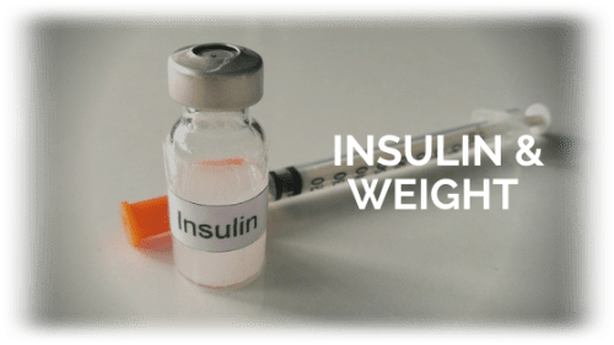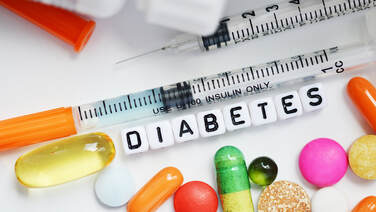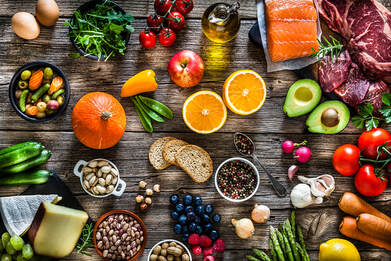What is Insulin?You've probably heard of insulin before. Understandably, a lot of people will associate it with diabetes. Diabetic or not, insulin plays a major role in our health. Therefore, if we want to give ourselves the greatest chance of avoiding disease & living with good health, it's important to have a general understanding of the role insulin plays & how its levels are affected. What is it & What Does it Do? Insulin is an anabolic hormone that is produced by the pancreas in response to increased blood glucose (sugar) levels. Whenever you eat food containing carbohydrates (& protein to an extent) that food is broken down into glucose and absorbed into the bloodstream - raising blood glucose levels. In order to prevent glucose continuing to circulate the bloodstream and leaving us with chronically high blood glucose (which is a precursor to all kinds of problems), insulin is released by the pancreas. Essentially, the action of insulin allows glucose to be stored in our cells. The primary sites of storage are the liver & muscle cells. Here, glucose is stored as glycogen, which can then be readily converted back into glucose for energy when needed. Once these sites have reached full replenishment, the body then resorts to storing any remaining excess glucose as fat - not what you want. In a healthy, well-functioning body, this whole process will take place smoothly and efficiently. However, if we neglect our health by leading highly sedentary lifestyles, maintaining poor nutrition, being highly stressed & getting little sleep, our cells will inevitably become insulin resistant. This is when things start to become problematic. Insulin Resistance & SensitivityInsulin resistance and sensitivity are two ends of the same spectrum. If cells are highly insulin resistant, they have low insulin sensitivity - and vice versa. Simply put, insulin resistance is when the cells of your liver, muscles, & fat have an inhibited response to insulin. This means that insulin is no longer efficient at storing blood glucose in your cells & consequently it requires more insulin to produce the same results. Muscle & liver cells become resistant first, meaning that glycogen storage drops - your supply of stored energy. Resultantly, a higher proportion of glucose is stored as fat - leading to weight gain. Eventually, if nothing changes, fat cells become resistant too.
Factors Affecting Insulin ResistanceThe key to improving insulin sensitivity is maintaining a health lifestyle. Stress, sleep, exercise, & diet should all be given attention & attempt to be optimised. Stress Whether you realise it or not, we're all in states of stress. Stress is necessary, but chronic elevated stress is severely harmful - it results in high levels of cortisol, a hormone which makes fat & muscle cells insulin resistant, whilst also enhancing the production of glucose by the liver. Begin incorporating behaviours into your lifestyle that will ultimately improve your stress levels. Reducing your caffeine intake, getting enough sleep, doing any parasympathetic activity (e.g. breathing, stretching), spending less time watching TV/staring at a screen, and going for a walk are all good options. Sleep With a lack of sleep we also experience increased cortisol levels. However, it's not only the amount of sleep that matters; the quality of our sleep is also significant when it comes to insulin resistance. Having poor quality sleep, irregular sleeping patterns, or disrupted sleep will all cause our circadian clocks to be negatively impacted. This is significant since our circadian clocks play a role in the regulation of several hormones that can impact the effects of insulin & key metabolic processes. Given the lockdown situation we're all in, now ought to be a time when we can ensure we're getting adequate sleep, whilst also forming healthy & consistent sleeping patterns - going to bed & waking up at responsible times. If your looking to improve the quality of your sleep, check out my earlier post on the importance of sleep.
Activity Remaining sedentary is harmful in several ways, but ultimately it means that the glycogen stores in your body aren't being used up. This means that each time you feed there is less capacity in your muscles & liver for glucose storage, resulting in more being stored as fat. Getting frequent exercise is a straight-forward way to improve insulin sensitivity. Simply by being active glycogen stores are utilised, stress levels are decreased over time, calories are being expended, & sleep quality will improve. The type of exercise isn't hugely significant - it's the doing it that matters. |
Author
Christian Lawal Personal Training.
Personal training in Tunbridge Wells, Tonbridge & Sevenoaks. Archives
January 2024
|



